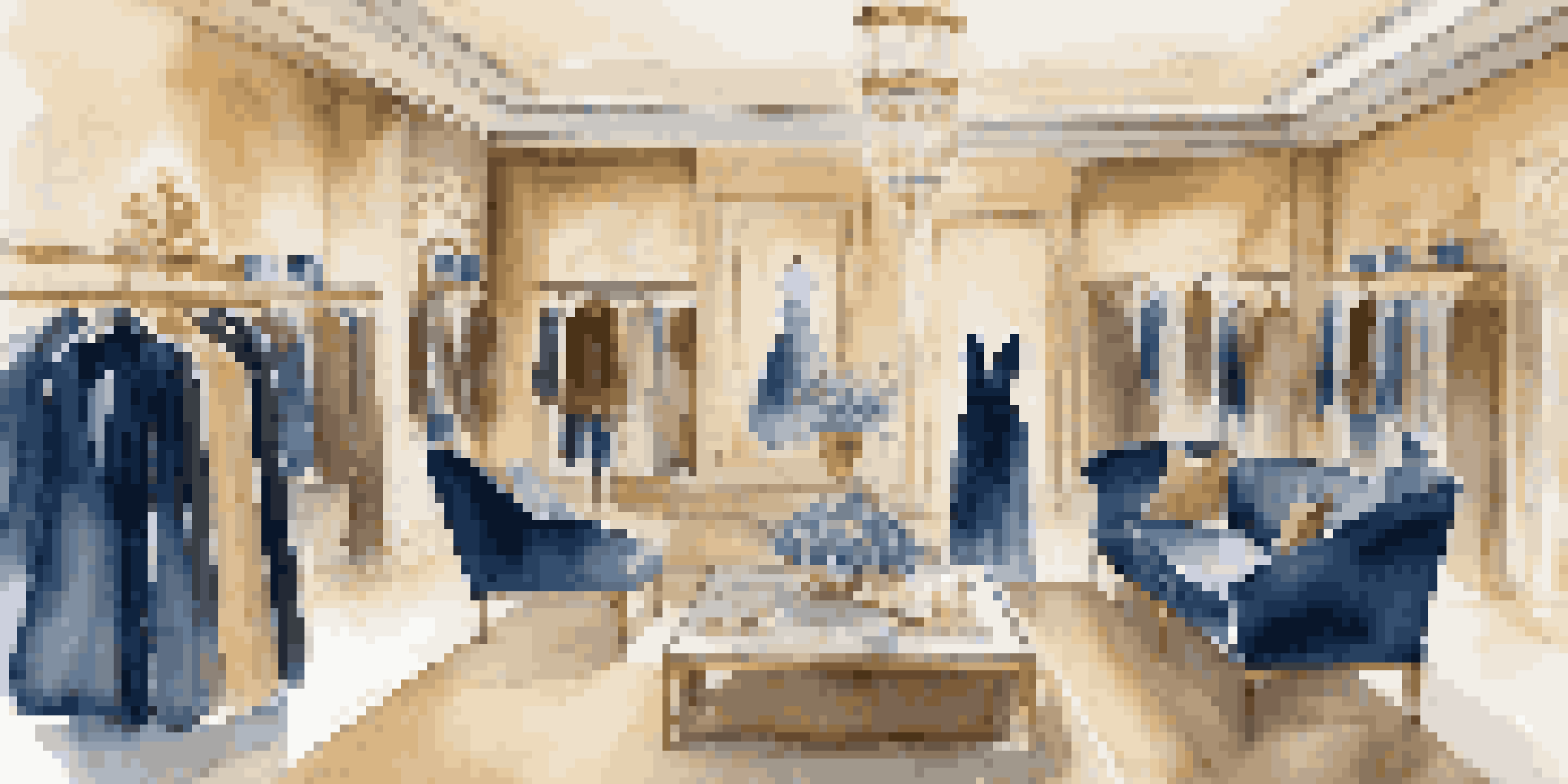The Future of Personalized Luxury in the Digital Age

Understanding Personalized Luxury in Today’s Market
Personalized luxury has evolved significantly in recent years, shifting from a generic high-end experience to one that is tailored to individual preferences. Consumers today crave unique products and services that resonate with their personal identities. This shift is driven by a growing sense of self-expression, where luxury is not just about status but also about personal storytelling.
Luxury is not about the money you spend, but about the stories you tell.
Luxury brands are now leveraging data to better understand their customers' needs and desires, allowing for a more customized shopping experience. For instance, a luxury watch brand might offer bespoke options based on a customer's style, past purchases, and even social media activity. This kind of targeted personalization creates a deeper emotional connection between the consumer and the brand.
Ultimately, the concept of personalized luxury is about creating value beyond the product itself. It's about crafting experiences that reflect the individuality of each customer, making them feel seen and appreciated. As we move forward, we can expect this trend to become even more pronounced as technology continues to advance.
The Role of Technology in Shaping Personalized Luxury
Technology plays a pivotal role in the evolution of personalized luxury, enabling brands to collect and analyze vast amounts of consumer data. Tools like artificial intelligence (AI) and machine learning help brands predict customer preferences and recommend products that fit their tastes. This not only enhances the shopping experience but also fosters brand loyalty as customers feel understood.

For example, luxury fashion retailers can use augmented reality (AR) to allow customers to virtually try on outfits before making a purchase. This interactive experience not only satisfies the desire for personalization but also reduces the likelihood of returns, which is a significant concern in the industry. Such innovations are changing the way consumers engage with luxury brands.
Personalization Drives Luxury Appeal
Consumers now seek unique, tailored luxury experiences that reflect their personal identities and values.
Moreover, as e-commerce continues to rise, personalized digital marketing strategies become essential. Tailored email campaigns and targeted social media ads can deliver curated product recommendations directly to consumers' inboxes, making the shopping experience seamless and enjoyable. This level of personalization is becoming a standard expectation in the luxury sector.
The Influence of Social Media on Personalized Luxury
Social media has transformed how luxury brands communicate with their customers, creating a platform for personalization on a grand scale. Brands can now interact directly with consumers, gathering insights into their preferences and lifestyles through likes, shares, and comments. This direct line of communication allows for more meaningful engagement and tailored marketing efforts.
In a world where everything is manufactured, personalization is the ultimate luxury.
Platforms like Instagram and Pinterest serve as visual showcases for luxury brands, enabling customers to curate their own experiences. For instance, customers can follow their favorite brands, receive updates on new collections, and even interact with brand ambassadors. This level of engagement helps brands to create a more personalized narrative around their products.
Additionally, user-generated content has become a powerful tool in the luxury industry. When customers share their experiences with luxury products online, it not only boosts brand visibility but also fosters a community of like-minded individuals. This sense of belonging is a crucial aspect of personalized luxury, making customers feel part of an exclusive club.
Sustainability and Ethical Practices in Luxury Personalization
As consumers become more conscious of sustainability, luxury brands are adapting their personalization strategies to align with ethical practices. Today’s luxury consumers are increasingly seeking brands that demonstrate a commitment to sustainability and social responsibility. This shift is prompting brands to integrate eco-friendly materials and ethical sourcing into their personalized offerings.
For instance, a luxury fashion brand might offer customized clothing made from sustainable fabrics, appealing to environmentally conscious consumers. By promoting transparency and ethical practices, brands can enhance their appeal and create a deeper connection with their audience. This is particularly relevant for millennials and Gen Z, who prioritize sustainability in their purchasing decisions.
Technology Enhances Customer Experience
Advanced tools like AI and AR enable brands to offer personalized shopping experiences, fostering deeper connections with consumers.
Furthermore, brands that embrace sustainability in their personalization strategies often find that it not only attracts customers but also fosters loyalty. When consumers feel that their values align with a brand’s practices, they are more likely to advocate for it, creating a community centered around shared beliefs. This evolving landscape of luxury personalization is paving the way for a more responsible approach to consumption.
The Rise of Experiential Luxury and Personalization
Experiential luxury is gaining traction as consumers increasingly seek meaningful experiences over material goods. This trend reflects a shift in values, where personal fulfillment and memorable moments take precedence over traditional luxury items. Brands are responding by offering personalized experiences tailored to individual preferences, creating deeper emotional connections.
For example, a luxury hotel might offer personalized wellness retreats, complete with tailored spa treatments and curated dining experiences. By focusing on unique experiences rather than just products, brands can stand out in a crowded market. This approach not only enhances customer satisfaction but also fosters a sense of loyalty as consumers associate positive memories with the brand.
Moreover, experiential luxury often allows for greater personalization than traditional luxury goods. Customers can customize every aspect of their experience, from the itinerary to the amenities provided. This level of personalization caters to the desire for authenticity and individuality, ensuring that each experience is truly one-of-a-kind.
Challenges in Delivering Personalized Luxury
While the benefits of personalized luxury are clear, brands face several challenges in delivering these tailored experiences. One of the primary hurdles is managing the vast amounts of data required to understand customer preferences accurately. Ensuring data privacy and security is paramount, especially as consumers become increasingly concerned about how their information is used.
Additionally, brands must strike a balance between personalization and maintaining an exclusive feel. Over-personalization can sometimes lead to a loss of luxury appeal, as it may come off as too accessible. Luxury brands need to carefully curate their offerings to ensure that they remain desirable while still catering to individual tastes.
Sustainability Shapes Luxury Choices
Today's luxury consumers prioritize sustainability and ethical practices, prompting brands to align their offerings with these values.
Lastly, the fast-paced nature of digital innovation requires brands to continuously evolve their personalization strategies. Staying ahead of trends and adapting to changing consumer expectations can be daunting, but it is essential for maintaining relevance in the luxury market. Brands that successfully navigate these challenges will be well-positioned for success in the future.
Looking Ahead: The Future of Personalized Luxury
As we look toward the future, personalized luxury is set to become even more sophisticated. Advances in technology, such as AI and virtual reality, will further enhance the ability of brands to tailor their offerings to individual consumers. This will create an even more immersive and customized shopping experience, where luxury becomes synonymous with personal identity.
We can also expect to see a greater emphasis on community and connection within the luxury sector. Brands will likely focus on building relationships with their customers, fostering a sense of belonging that goes beyond the purchase. This shift towards community-driven luxury will allow brands to create shared experiences that resonate on a deeper level.

Ultimately, the future of personalized luxury will hinge on understanding the evolving desires of consumers. As lifestyles continue to change, luxury brands must remain agile and responsive to these shifts. By embracing innovation and prioritizing customer experience, the luxury market can thrive in the digital age.